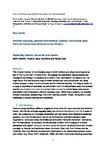Exploring schools' use of natural spaces
| dc.contributor.author | Gilchrist, M | |
| dc.contributor.author | Passy, Rowena | |
| dc.contributor.author | Waite, Sue | |
| dc.contributor.author | Cook, R | |
| dc.contributor.editor | Freeman C | |
| dc.contributor.editor | Tranter P | |
| dc.date.accessioned | 2016-06-03T10:16:50Z | |
| dc.date.accessioned | 2016-06-03T10:19:46Z | |
| dc.date.available | 2016-06-03T10:16:50Z | |
| dc.date.available | 2016-06-03T10:19:46Z | |
| dc.date.issued | 2016-04-10 | |
| dc.identifier.isbn | 978-981-4585-99-6 | |
| dc.identifier.uri | http://hdl.handle.net/10026.1/4823 | |
| dc.description.abstract |
This chapter focuses on the changing ways in which schools are using natural spaces as part of their pupils’ learning experience. We suggest that learning in natural spaces has undergone something of a renaissance in recent times, and explore the reasons that this might be so. We then examine ways in which schools and other practitioners are using outdoor spaces for play, for non-curricular and for curricular learning. The chapter draws on a range of countries for examples that show how a nation’s cultural ideas about the outdoors can be incorporated into a country’s outdoor learning, and how other ideas travel across boundaries to be interpreted in different practical ways. Within these sections, we consider different theoretical underpinnings that inform learning outside. Finally, the benefits of and challenges to outdoor learning are considered. | |
| dc.format.extent | 1-22 | |
| dc.language.iso | en | |
| dc.publisher | Springer | |
| dc.relation.ispartof | Risk, Protection, Provision and Policy | |
| dc.relation.replaces | http://hdl.handle.net/10026.1/4822 | |
| dc.relation.replaces | 10026.1/4822 | |
| dc.subject | outdoor learning | |
| dc.subject | natural environment | |
| dc.subject | schools | |
| dc.subject | curriculum | |
| dc.subject | play | |
| dc.subject | Natural Connections Demonstration Project | |
| dc.title | Exploring schools' use of natural spaces | |
| dc.type | chapter | |
| plymouth.volume | Vol 12 | |
| plymouth.publication-status | Published | |
| plymouth.series | Vol. 12 of Skelton, T. (ed) Geographies of Children and Young People | |
| dc.identifier.doi | 10.1007/978-981-4585-99-6_18-1 | |
| plymouth.organisational-group | /Plymouth | |
| plymouth.organisational-group | /Plymouth/Faculty of Arts, Humanities and Business | |
| plymouth.organisational-group | /Plymouth/Faculty of Arts, Humanities and Business/Plymouth Institute of Education | |
| plymouth.organisational-group | /Plymouth/REF 2021 Researchers by UoA | |
| plymouth.organisational-group | /Plymouth/REF 2021 Researchers by UoA/UoA23 Education | |
| plymouth.organisational-group | /Plymouth/Research Groups | |
| plymouth.organisational-group | /Plymouth/Research Groups/Institute of Health and Community | |
| plymouth.organisational-group | /Plymouth/Users by role | |
| plymouth.organisational-group | /Plymouth/Users by role/Academics | |
| dc.publisher.place | Singapore | |
| dc.rights.embargoperiod | No embargo | |
| rioxxterms.versionofrecord | 10.1007/978-981-4585-99-6_18-1 | |
| rioxxterms.licenseref.uri | http://www.rioxx.net/licenses/all-rights-reserved | |
| rioxxterms.type | Book chapter | |
| plymouth.funder | Understanding educational and wellbeing implications of learning outside the classroom through cross-national collaboration::ESRC |


